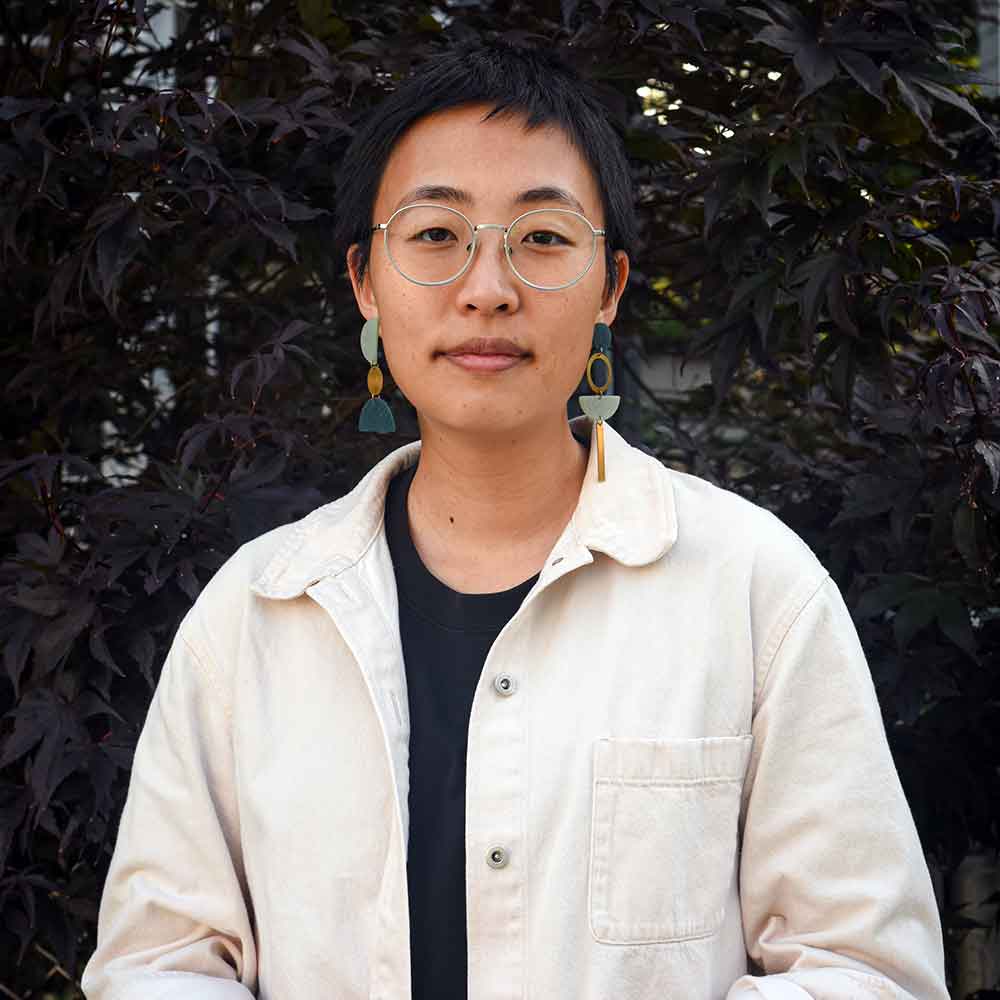Artist Statement
In “eating my way home,” I pair written vignettes with photographs taken during my childhood and 2015-2017 when I lived in Korea. I invite readers into my memories as I respond to questions that have been lost–or rather, left unspoken–within my Korean immigrant family. As our intertwined journeys of migration, survival, and identity formation unfold, what parts of ourselves have we left behind? And who have we now become, as individuals and together as a family?
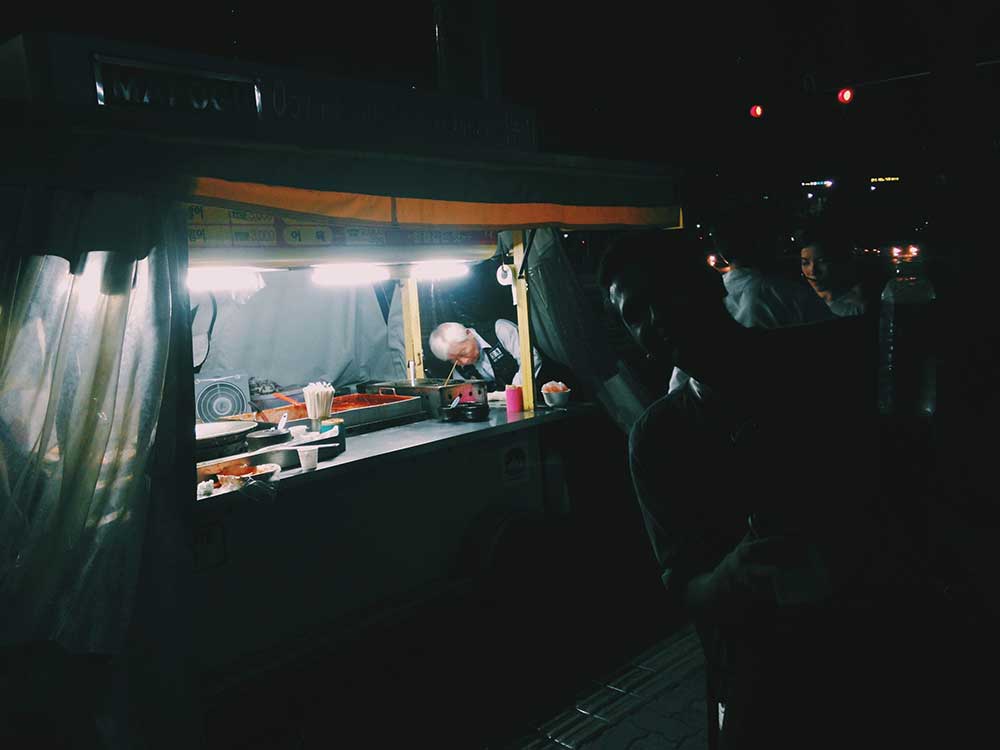
2017, seoul: a bunshik1 stand near my apartment.
i spend many nights here, eating my fill in the midst of strangers. next to me, two lovers share a plate in haste. next to them are businessmen buttoned into white-collared shirts, gray suit jackets draped over one arm. they bow their heads while leaning over plates of ddeukbokki2 and mandu3, fried crisp and golden by the tanned hands of women who tend to this watering hole for late-night itinerants like us.
the far-left corner is where i stand, alone with my portion. i peel off my outer layer—a green army-style jacket frayed at the edges with jet black pen ink stains bleeding through its pockets—and drape it over my arm. i too bow my head and draw close to my plate. here we are, creating our own last supper in the dead of night. who knows where each of us will go after this meal, but i push that thought aside while we feast. as for me, i only have these chopsticks, splintered after prying the halves apart, to guide me forward.
i am twenty-four years old. two years have passed since i first moved to korea, the land my parents called home over thirty years ago before they immigrated to the united states. throughout college, i accumulated stacks of history books about the korean diaspora and audio recordings of my parents sharing their life stories with me. but the further I searched within these texts, the clearer it became that my own story was nowhere to be found. no one will script my life for me.
history is a cartographer, and i hold the pen.
1 bunshik refers to korean street food, commonly sold from food truck-like stands.
2 ddeukbokki is a common korean street food, usually consisting of cylindrical rice cakes and rectangular fish cake sheets that swim in a spicy red chili sauce, turned viscous from hours of simmering and the occasional smattering of corn starch or other thickening agent.
3 mandu is a dumpling with a meat and vegetable filling that is folded into its wrapper, thin enough to see the filling’s bumps and pinky hues, but thick enough to ensure an effortlessly chewy moment when one bites through its exterior to reach the juicy center.
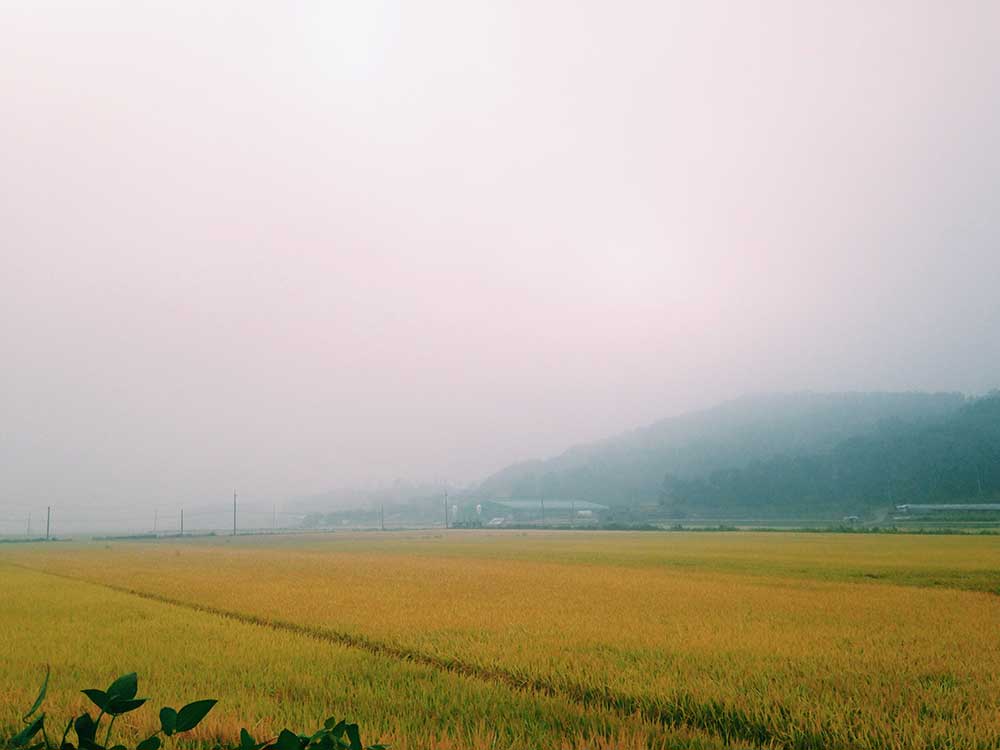
2015, seocheon: a seaside town where cars share the road with tractors, flatbed trucks carry one-person businesses that sell everything from chickens to second-hand electronics, and my morning commute creeps around rice fields. barely one month has passed since i moved in with my homestay family and began working at a nearby high school.
i wake up to my phone vibrating underneath my pillow. It is too early to be awake on a weekday in october. my phone screen touches my nose. a few moments pass before the text registers in my brain: umma4 is calling. i fling my right hand onto the window sill; my fingers grope around for my eyeglasses before landing upon their frame. as is ritual, i steel myself before carefully swiping my thumb across the screen.
“it’s appa5. he took a check from my purse and bought a plane ticket to korea. one-way. he wants to start a new life, he says.”
she warns me that he may visit me when he runs out of money. she reassures me that he will eventually return home, as he never failed to reappear on our front doorstep, days or weeks later, penniless from his gambling ventures. he is flying high across the ocean as we speak.
after a long pause, umma whispers to me, “i’m sorry, hwi-young6.”
my mother is an avid gardener who salvages every seed in the hopes that they will one day sprout anew. in doing so, she has successfully transformed our living room into a sprawling jungle of potted succulents and sprouted avocados. but her green thumb alone could not grow a new life for my father, and she has grown weary from praying for this cup to be lifted from her.
even jesus once said, “my soul is very sorrowful, even to death; remain here, and watch with me7.” i join my mother in facing the questions that now sit uncovered at the heart of our family: what is my father looking for in this “new life,” and will he ever find it?
4 umma means “mom.”
5 appa means “dad.”
6 my Korean name is hwi-young; both syllables are based on chinese characters meaning “giving off light.”
7 matthew 26:38. the story goes that jesus asked his disciples to stay awake while he prayed in gethsemane before his arrest.1 bunshik refers to korean street food, commonly sold from food truck-like stands.
2 ddeukbokki is a common korean street food, usually consisting of cylindrical rice cakes and rectangular fish cake sheets that swim in a spicy red chili sauce, turned viscous from hours of simmering and the occasional smattering of corn starch or other thickening agent.
3 mandu is a dumpling with a meat and vegetable filling that is folded into its wrapper, thin enough to see the filling’s bumps and pinky hues, but thick enough to ensure an effortlessly chewy moment when one bites through its exterior to reach the juicy center.
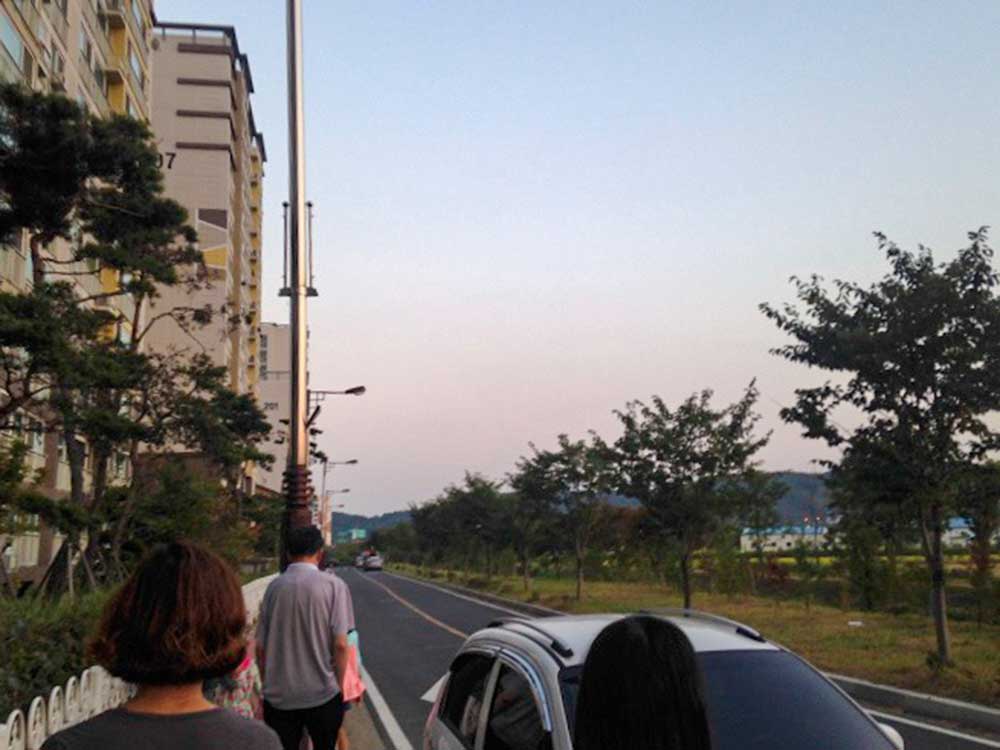
appa says he wants to meet my homestay family and share a few drinks with my homestay father—because “we’re korean men,” they both say. i follow his lead, despite knowing that he has never walked this path before. i think of umma, whose grief traveled across oceans to press upon the flesh of my heart. perhaps i can no longer avoid returning full-circle to my parents—the two people who gave me my body, my first home—in order to write my own story into existence.
my eyes trace the contours of appa’s back, a topographical map of the years he has lived, most of which still remain unknown to me. what did he leave behind when he immigrated to the united states at the age of twenty-four, just two years older than i am now? perhaps he left behind his childhood friends: boys who would grow up together and become drinking buddies, men holding fast to each other as firmly as they cling to the bottle. perhaps he left behind a life as a bachelor, without a wife and family waiting for him to bring home a paycheck. in this “new life,” perhaps he is looking to once again feel the trepidation and possibility that fueled his first trek across the ocean. perhaps he is looking to find himself, too.
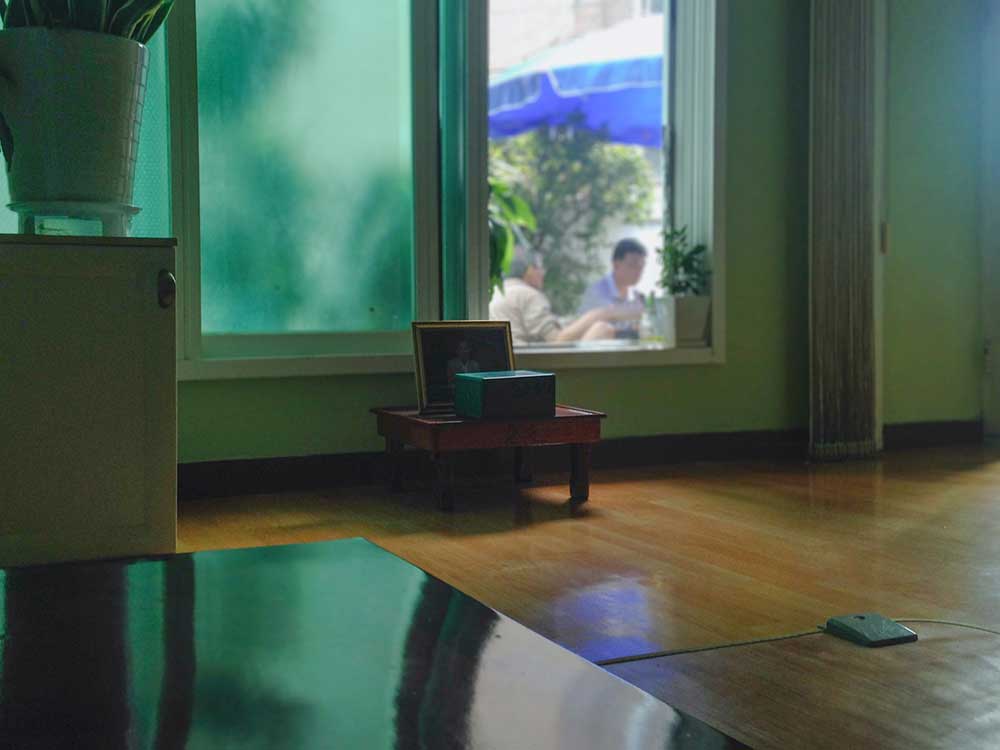
a few weeks after his trip to seocheon, i visit appa at his younger sister’s house in seoul. In the living room sits a portrait of my grandmother, framed and displayed on a low table the size of a lunch tray. a smooth container polished with a lush green hue sits in front of the photograph. appa tells me that he flew to korea to spread halmeoni’s8 ashes in the han river. it is illegal to do so now, so he and his sister traveled in secret to a mountain creek north of seoul to return halmeoni to the earth.
what do you do when the journey home brings you back to a place where you can no longer enter? or to someone whose warmth no longer exists outside of memory? my father leaves his motherland once again, and i weep on the train ride back to seocheon.
8 halmeoni means “grandma.”4 umma means “mom.”
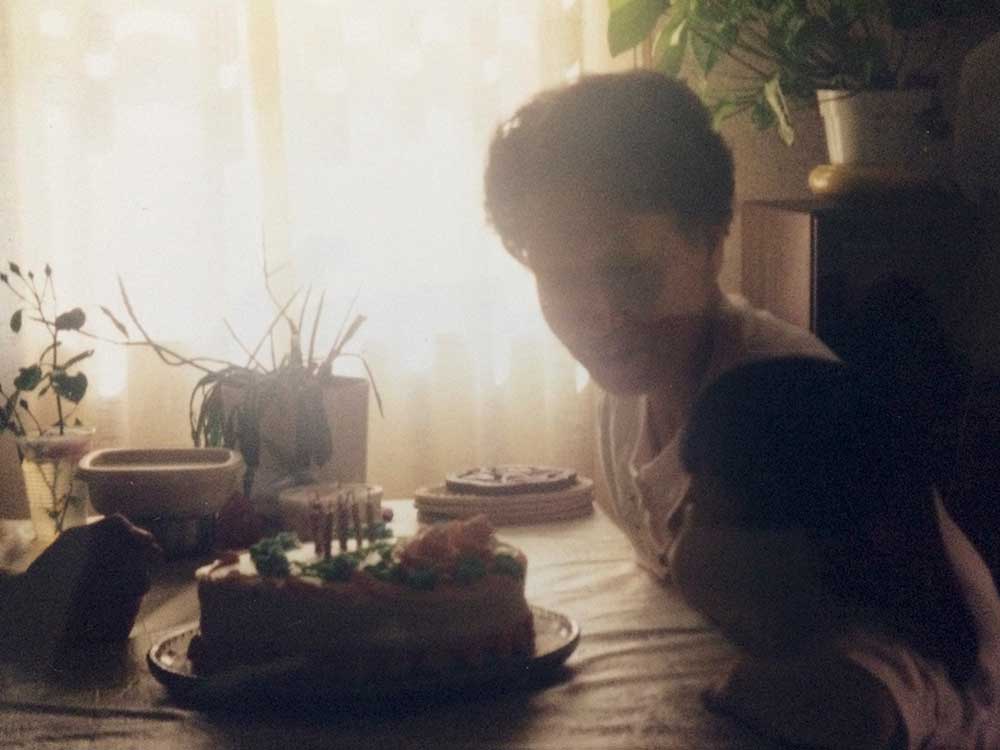
1999, hanover, massachusetts. my seventh birthday. halmeoni and appa wait for me to blow out every candle.
i am too young to grasp the depth of appa’s silence, but i am familiar with his absence. i know not to disturb him when he steals away to his basement office, vodka bottle in hand. i know not to look for him when ballad riffs and orchestral strings—tell-tale signs that a korean drama is playing on tv—drift upstairs. i wonder if the singers’ throats hurt after releasing such sadness and longing through their melodies.
instead, i wait for him at the dining room table at the appointed time each day. like clockwork, he emerges from his hideaway to join the rest of our family for a meal. he does not say much, besides the slurps of soup that betray his silence. my mother, younger brother, and I have grown used to this rhythm, and we bow our heads towards our own bowl and eat with our mouths muffled with rice.
perhaps appa and i have been searching for the same thing: a memory, folded inside a dumpling that reminds us of the hands and rhythms keeping us alive throughout all these years, and the homes we have foraged along the way.
we traveled through the silences, pain, and questions to finally arrive at the heart of a matter. what lies ahead is for us to speak the words that we can no longer hold back: those piping-hot, sometimes acidic and heartburn-inducing, glimmering pieces of truth that bubble to the surface of our tongues. all we hope for is grace to meet us on the other side, wherever this journey takes us next.
i tried making mandu-guk9 once when i was living on my own in seoul. the pot simmered for a moment too long; clear anchovy broth bubbled over as i ran back to the stove to turn off the flame. i peered inside the pot. a few mandu had burst open and transformed the dish into a milky stew. my stomach rumbled, and i set the table for dinner for one, even though the portions could easily feed a family of five.
9 guk means “soup.”8 halmeoni means “grandma.”4 umma means “mom.”
